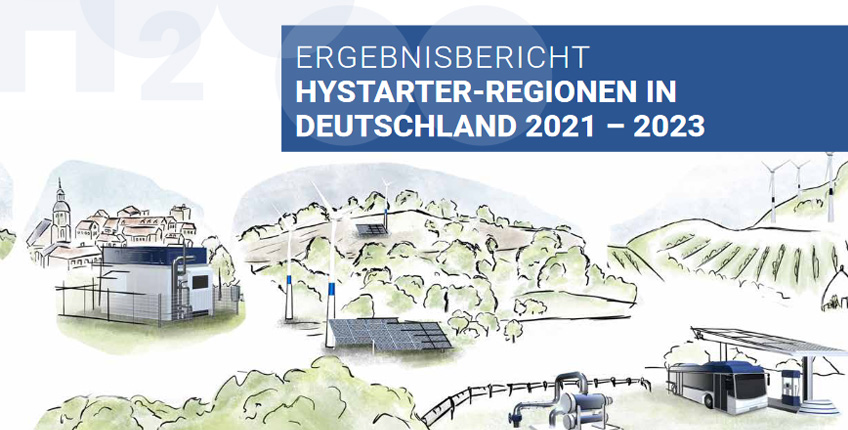A total of 15 regions were selected by the Federal Ministry for Digital and Transport (BMDV) to participate in the HyLand competition in the HyStarter II category in 2021. Supported by a consortium of experts, the regions each developed a concept for the ramp-up of a regional hydrogen economy. The results have now been published in a comprehensive report.
Between 2021 and 2023, 15 selected regions in Germany drafted pioneering concepts for the development of a regional hydrogen economy as part of the second round of the HyLand competition initiated by the Federal Ministry of Digital and Transport (BMDV). These projects were supported for a year by experts from the consulting firms EE ENERGY ENGINEERS, Nuts One and Spilett new technologies. Now, with the publication of the cross-regional results report, this HyStarter phase has officially come to an end. For the regions themselves, the conclusion of their HyStarter project phase does not signify the end as such, but rather represents the beginning of the implementation of the regional hydrogen concepts they have developed.
The results in the cross-regional report (in German) show how to establish and operate stakeholder networks in hydrogen regions and which helpful tools are available to them. In addition, the report also presents the latest insights into the market for hydrogen technologies as well as existing hurdles and challenges. It is from this basis that the regions derive a series of recommendations for action for business and politics.
400 stakeholders involved in regional hydrogen roadmaps
In the 15 participating regions, more than 400 regional stakeholders from politics and public administration, industry, municipal and private companies, associations, civil society and research institutions worked in six strategy dialogues on a common vision for their hydrogen region by 2030. Strategies for implementing this vision were developed and the first concrete projects identified. These projects were then brought together in integrated approaches and their technical feasibility was discussed and reviewed. As part of the preparations for implementation, regional roadmaps were drawn up that set out specific activities, timetables and milestones while also clarifying responsibilities.
The discussions in the strategy dialogues were supplemented by needs-oriented workshops on hydrogen production paths, transport options for hydrogen, possible applications in the transport, industry and on-site energy supply sectors, as well as the legal and regulatory framework conditions.
The HyLand network as a knowledge base for regional hydrogen projects
The accumulated knowledge and experience gained by the regions during the HyStarter phase is not only a tremendous treasure trove of know-how for the regions themselves. All regions involved in the HyLand network in the other categories and from the first HyLand phase also benefit from this and are invited by the coordinators to a continuous exchange of knowledge and experience, specialist workshops and networking meetings – even beyond the end of the official funding period.
Working together with stakeholders from the social sphere
In addition to the projects in the regions, HyStarter II also involved cooperation with key stakeholders in the social debate who have not yet developed a public position on hydrogen and fuel cell technology in the context of climate-friendly mobility technologies. These included the Deutsches Tiefkühlinstitut e.V., the Deutscher Gewerkschaftsbund, AGRAVIS Raiffeisen AG, the Forschungsstätte der Evangelischen Studiengemeinschaft e.V. (FEST) and the Wacken Open Air Festival GmbH (WOA). The focus of the collaboration was the transfer of knowledge to the application sector and the dissemination of the organisations’ own positions, which were published on their respective websites (see links below).
Second HyStarter phase of the HyLand programme
The selection of HyStarter II regions reflects the diversity of regional characteristics in Germany. The regions ranged from metropolitan regions with over 1.5 million inhabitants to municipal regions with around 8,000 inhabitants. The consortium’s support for the regions was explicitly open-ended; each region was free to decide not to publish its hydrogen concept. In the course of the strategy dialogues, all participants recognised the added value of a climate-neutral energy supply based on green hydrogen and showed a willingness to use hydrogen and fuel cell technologies in everyday life and to take the necessary infrastructure into consideration.
These pioneering initiatives are a decisive step towards a sustainable, environmentally friendly future. The HyStarter regions are ready to tackle the challenges of the future and drive the hydrogen economy in Germany forward.
For more information and contacts to the participating regions and organisations, please visit www.hy.land.
Downloads (in German):
All individual final reports of the HyStarter II regions
Position papers (in German):
AGRAVIS: Wasserstoff in der Landwirtschaft – Neue Energie nutzen


